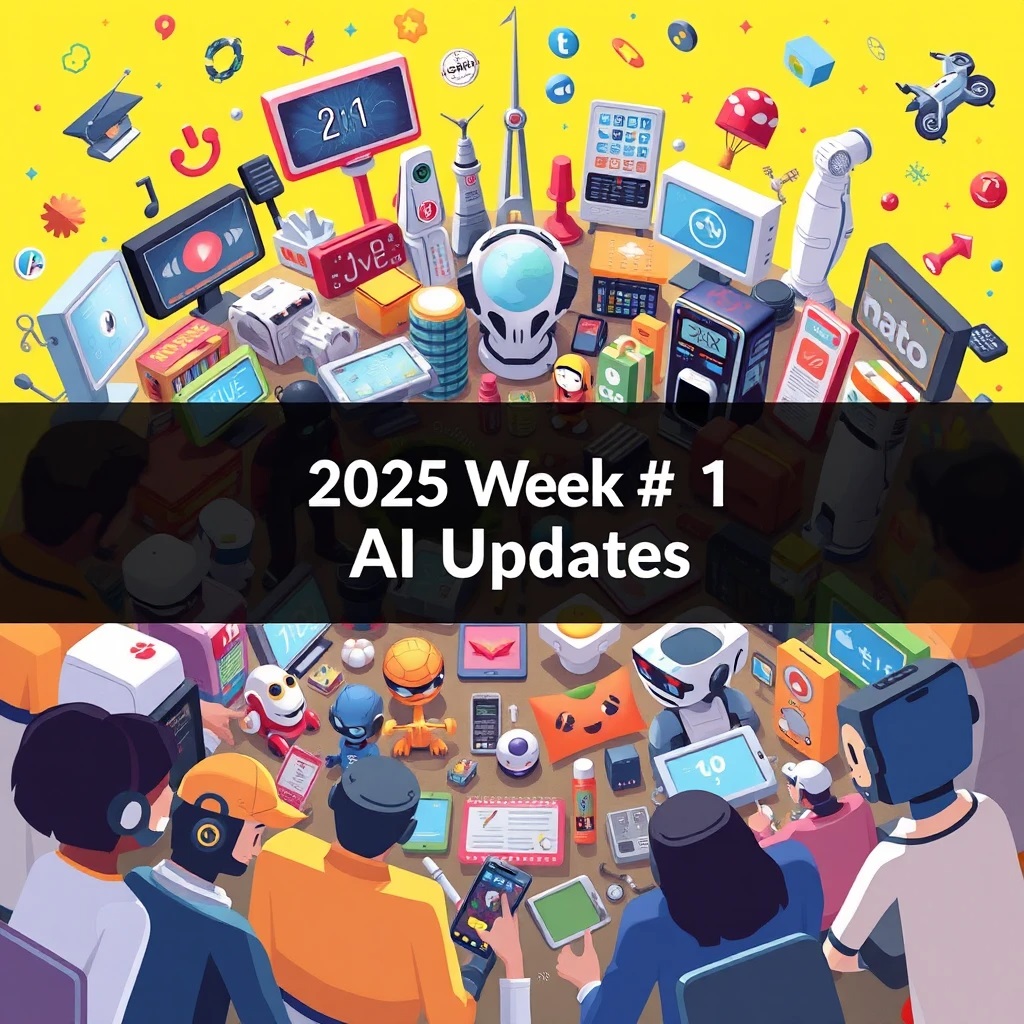Last Updated on January 7, 2025 by Editor
As we enter the first ai week of 2025, everyone wonders about the latest ai developments. Saudi Arabia has called for a global ai agreement, sparking a big debate on regulation. Also, ai is making big strides in breast cancer screening, showing its power to change healthcare. This week, we’ve seen big announcements from tech giants like NVIDIA at CES 2025. They talked about ai, cars, and language models. Looking forward, ai will keep changing the world, from healthcare to gadgets, leading to new ai breakthroughs.
Key Takeaways
- The first ai week of 2025 saw significant developments in the ai world, including Saudi Arabia’s call for a global agreement to govern artificial intelligence.
- The use of ai in breast cancer screening has shown promising results, highlighting the potential of ai to transform healthcare and drive ai advancements 2025.
- NVIDIA’s keynote at CES 2025 showcased the company’s latest advancements in ai, automotive, and language models, and its impact on ai world updates 2025.
- More than 1,500 Atrium Health doctors are licensed to use DAX Copilot, an ai tool that transforms conversations into clinical visit summaries, saving doctors time and driving ai trends 2025.
Here are some of the most notable stories:
NVIDIA’s Cosmos Platform Launch
NVIDIA unveiled its Cosmos platform at CES 2025, marking a transformative step in physical AI. This platform allows developers to create and train AI models in a simulated environment that accurately reflects real-world physics, such as gravity and friction. It features advanced neural networks capable of generating vast amounts of synthetic data, which accelerates AI training processes significantly. CEO Jensen Huang described it as a “ChatGPT moment for robotics,” emphasizing its potential impact on industries like autonomous vehicles and robotics. The introduction of an AI supercomputer built on the Hopper architecture further enhances NVIDIA’s capabilities in training complex models for various applications, including healthcare and generative AI.
Intel’s AI-Powered PCs
Intel showcased its vision for the future of computing with the launch of AI-powered PCs at CES 2025. The new Lunar Lake processors are designed for commercial use, offering energy efficiency and on-device AI processing. Additionally, Intel introduced the Core Ultra 200H series, which boasts significant performance improvements and integrated Neural Processing Units (NPUs). These advancements enable real-time tasks such as image generation and transcription directly on devices, reflecting Intel’s commitment to integrating AI into everyday computing experiences.
ASUS Introduces the First AI-Powered Router
ASUS made headlines with the launch of the world’s first AI-powered gaming router, the ROG Rapture GT-BE19000AI. This router features a built-in Neural Processing Unit that optimizes bandwidth allocation dynamically, ensuring smooth gaming and streaming experiences. With speeds reaching up to 19,000 Mbps, it is tailored for high-demand applications like cloud gaming and 8K streaming. The router also incorporates advanced security features to protect against cyber threats in real time, showcasing how AI can enhance home networking solutions.
AI’s Role in Healthcare Appointments
A report highlighted that AI may soon play a role in healthcare appointments by listening in on conversations between patients and doctors. This technology aims to improve patient care by ensuring accurate record-keeping and follow-up recommendations. While this innovation promises enhanced communication and efficiency in healthcare settings, it also raises ethical concerns regarding privacy and consent, necessitating careful consideration as it develops.
Saudi Arabia’s Call for Humanitarian AI
In a significant political move, Saudi Arabia has called for the development of humanitarian AI amidst tightening restrictions on rights protesters. This initiative aims to leverage AI technologies to address humanitarian issues while navigating complex socio-political landscapes. The call reflects a growing recognition of AI’s potential role in social good, even as concerns about surveillance and rights violations persist.
Cybersecurity Predictions Involving AI
Experts have predicted that AI will play a crucial role in shaping cybersecurity strategies for 2025. As cyber threats become more sophisticated, organizations are increasingly looking towards AI-driven solutions to enhance their defenses. These predictions highlight the dual nature of AI’s impact—while it can be used by malicious actors, it also offers powerful tools for protection against such threats.
Meta Shuts Down AI Profiles
Meta faced backlash over cultural biases and ethical concerns, leading to the shutdown of 28 AI profiles. The decision reflects growing scrutiny over AI’s role in perpetuating stereotypes and misinformation. Meta’s move aims to enhance transparency and address public concerns about the ethical implications of AI technologies. This incident underscores the importance of responsible AI development in maintaining user trust and societal acceptance.
Russia Deepens AI Collaboration with China
Amid ongoing Western sanctions, Russia has intensified its AI partnership with China. President Vladimir Putin has mandated collaboration between Russian entities, including Sberbank, and Chinese firms to strengthen their technological capabilities. This strategic alliance seeks to mitigate the impact of sanctions while enhancing both nations’ positions in the global AI landscape. The partnership highlights the geopolitical dimensions of AI development and competition.
OpenAI’s Transition to Public Benefit Corporation
OpenAI announced its transition from a for-profit entity to a Public Benefit Corporation (PBC). This change aims to secure funding for the development of Artificial General Intelligence (AGI) while preserving its commitment to societal impact. OpenAI’s leadership emphasized that this structure will allow for more accountability and alignment with broader ethical goals, ensuring that AGI benefits humanity as a whole.
Alibaba’s Qwen Surpasses Competitors
Alibaba introduced its new model, QVQ-72B-Preview, which reportedly outperforms GPT-4o in multimodal benchmarks. This model integrates vision and language processing capabilities, achieving high scores in visual reasoning tasks. Alibaba’s advancements reflect the competitive landscape in AI development, where companies are racing to push the boundaries of what these technologies can achieve.
DeepSeek V3 Emerges as a Leader in Open-Source AI
The release of DeepSeek V3 has positioned it as a top contender among open-source AI models. With its innovative Mixture-of-Experts architecture, DeepSeek V3 boasts exceptional benchmark scores and efficient training processes. This model signifies a shift towards more accessible high-performance AI solutions, catering to a diverse range of applications across industries.
Elon Musk’s xAI Secures Major Funding
Elon Musk’s company, xAI, successfully raised $6 billion in its latest funding round, doubling its valuation to $45 billion. The funds will be utilized to accelerate innovation and research and development efforts within the company. Musk’s ambitious vision for xAI continues to attract significant investor interest, reflecting confidence in the future of AI technologies.
Predictions from Tech Leaders on AI Integration
Prominent tech leaders, including Bill Gates and Sam Altman, shared their predictions for AI integration in 2025. They foresee AI becoming deeply embedded in workplaces and consumer behavior, transforming how businesses operate. Concerns about job displacement and ethical considerations are also highlighted, emphasizing the need for responsible development as AI technologies evolve.
Samsung’s “AI for All” Vision
At CES 2025, Samsung unveiled its “AI for All” vision, aiming to integrate AI into everyday life across various devices. The company plans to enhance user experiences through personalized services enabled by its SmartThings platform. This initiative reflects Samsung’s commitment to making AI accessible and impactful in consumers’ daily routines.
Rise of Personalized AI Services
The emergence of personalized AI services is anticipated as major tech companies like Microsoft and Apple integrate advanced features into their products. These tools will offer tailored assistance based on individual user preferences, marking a shift towards more interactive and responsive technology. However, this evolution raises questions about privacy and data security as users grant access to personal information.
The Agentic Era of AI Begins
Experts predict that 2025 will mark the beginning of the agentic era in artificial intelligence, characterized by the rise of proactive AI agents capable of performing complex tasks autonomously. Unlike traditional chatbots, these agents can reason and plan without constant user input, potentially revolutionizing workflows across industries. As companies prepare for public releases of these systems, widespread adoption is expected to follow rapidly.
As we reflect on the remarkable advancements and trends in artificial intelligence during the first week of January 2025, it is clear that the landscape is evolving rapidly, with significant implications for technology, industry, and education. From groundbreaking innovations at CES to strategic acquisitions and the growing emphasis on ethical AI practices, the momentum is palpable. As we look ahead to the upcoming weeks, we eagerly anticipate further developments that will shape the future of AI and its integration into our daily lives, promising exciting opportunities and challenges for all stakeholders involved.





Pingback: AI Week # 02 of 2025: Unveiling Funding Trends, Innovations, and Platform Updates from January 8-14 - uniAIversity